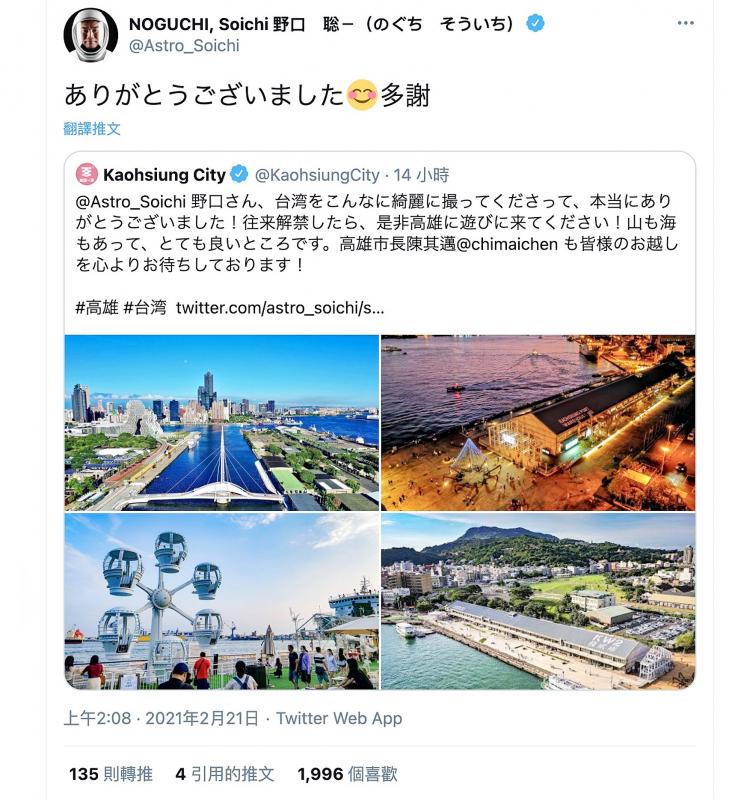The Kaohsiung City Government on Saturday tweeted an invitation to Japanese astronaut Soichi Noguchi to visit the city, after Noguchi on Friday shared on Twitter a photograph of Taiwan taken from space.
The photo was of the southern half of Taiwan proper, taken from the International Space Station.
Noguchi had previously posted on Twitter nighttime photos of Kaohsiung and Tainan, also taken from the International Space Station, which received likes from more than 19,000 people.

Photo: Screen grab from Twitter
In its tweet, which was written in Japanese, the city government thanked Noguchi for “so beautifully capturing Taiwan” in his photo.
The post included pictures from different locations in Kaohsiung, and said that Noguchi should visit once the COVID-19 pandemic has ended.
Kaohsiung Mayor Chen Chi-mai (陳其邁) and others in the city government sincerely awaited Noguchi’s visit, the post said.
On Sunday, Noguchi responded, writing “thank you very much” in Japanese and Chinese.
In Chinese, Noguchi wrote the characters for “duo xie” (多謝), which is the most common way of saying “thank you” in Hoklo — also known as Taiwanese — the language spoken most widely in southern Taiwan.
Chen replied to Noguchi’s tweet, also writing “duo xie.”
Upon hearing of the exchange, Kaohsiung Information Bureau Director Tung Chien-hung (董建宏) said that Twitter has come to play an important role in the city’s diplomacy, as well as in promoting tourism there.
In 2017, Lonely Planet listed Kaohsiung as one of the top 10 city destinations for backpackers, after its Hong Kong-based travel writer gathered information about the city through the bureau’s official Twitter account, he said.
In 2018, Lonely Planet also wrote on Twitter that the city was “#Taiwan’s blossoming cultural city.”
“Twitter has more than 310 million users worldwide, and Kaohsiung has been using the platform to promote the city since 2015,” Tung said.
The bureau primarily uses English and Japanese on Twitter, but has also begun using other languages, including Thai and Vietnamese, he said.
“We have already posted more than 1,400 tweets, and have more than 62,000 followers. We have also received verification from Twitter,” he added.

A group of Taiwanese-American and Tibetan-American students at Harvard University on Saturday disrupted Chinese Ambassador to the US Xie Feng’s (謝鋒) speech at the school, accusing him of being responsible for numerous human rights violations. Four students — two Taiwanese Americans and two from Tibet — held up banners inside a conference hall where Xie was delivering a speech at the opening ceremony of the Harvard Kennedy School China Conference 2024. In a video clip provided by the Coalition of Students Resisting the CCP (Chinese Communist Party), Taiwanese-American Cosette Wu (吳亭樺) and Tibetan-American Tsering Yangchen are seen holding banners that together read:

UNAWARE: Many people sit for long hours every day and eat unhealthy foods, putting them at greater risk of developing one of the ‘three highs,’ an expert said More than 30 percent of adults aged 40 or older who underwent a government-funded health exam were unaware they had at least one of the “three highs” — high blood pressure, high blood lipids or high blood sugar, the Health Promotion Administration (HPA) said yesterday. Among adults aged 40 or older who said they did not have any of the “three highs” before taking the health exam, more than 30 percent were found to have at least one of them, Adult Preventive Health Examination Service data from 2022 showed. People with long-term medical conditions such as hypertension or diabetes usually do not

POLICE INVESTIGATING: A man said he quit his job as a nurse at Taipei Tzu Chi Hospital as he had been ‘disgusted’ by the behavior of his colleagues A man yesterday morning wrote online that he had witnessed nurses taking photographs and touching anesthetized patients inappropriately in Taipei Tzu Chi Hospital’s operating theaters. The man surnamed Huang (黃) wrote on the Professional Technology Temple bulletin board that during his six-month stint as a nurse at the hospital, he had seen nurses taking pictures of patients, including of their private parts, after they were anesthetized. Some nurses had also touched patients inappropriately and children were among those photographed, he said. Huang said this “disgusted” him “so much” that “he felt the need to reveal these unethical acts in the operating theater

Heat advisories were in effect for nine administrative regions yesterday afternoon as warm southwesterly winds pushed temperatures above 38°C in parts of southern Taiwan, the Central Weather Administration (CWA) said. As of 3:30pm yesterday, Tainan’s Yujing District (玉井) had recorded the day’s highest temperature of 39.7°C, though the measurement will not be included in Taiwan’s official heat records since Yujing is an automatic rather than manually operated weather station, the CWA said. Highs recorded in other areas were 38.7°C in Kaohsiung’s Neimen District (內門), 38.2°C in Chiayi City and 38.1°C in Pingtung’s Sandimen Township (三地門), CWA data showed. The spell of scorching